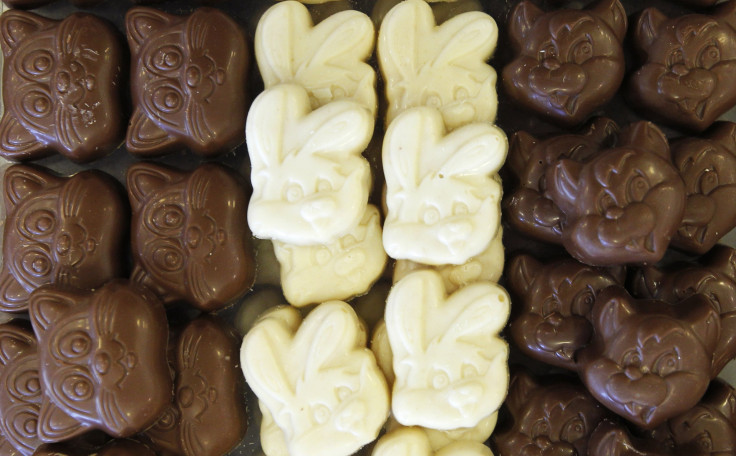Is Chocolate Dangerous For Cats And Dogs? Foods That Are Hazardous For Pets

When your pet is looking at you wide-eyed as you eat dinner or nibble on a snack, it may not be the best idea to give him or her a taste, especially if it’s dessert. Chocolate is bad for both cats and dogs, as well as other pets, according to the American Society for the Prevention of Cruelty to Animals (ASPCA). Chocolate can contain high amounts of fat and caffeine-like stimulants known as methylxanthines, which can cause adverse side effects in pets.
For dogs, chocolate consumed in significant amounts can lead to symptoms such as vomiting and diarrhea, panting, excessive thirst and urination, hyperactivity, abnormal heart rhythm, tremors, seizures and even death. The ASPCA warns that cats may suffer similar side effects and that chocolate can be "toxic."
All types of chocolate—dark, milk and white—present some potential danger, but the darker the chocolate, the greater the risk. The ASPCA reported dark chocolate has higher levels of methylxanthine, which can cause poisoning. As little as 4 ounces of milk chocolate or only 0.5 ounces of baking chocolate is bad for a small dog weighing 10 pounds. And while small amounts of lighter chocolate can seem harmless enough, chocolate can still cause vomiting and diarrhea or the development of pancreatitis.
Chocolate isn't the only food that's hazardous to cats and dogs. For felines, the ASPCA warns against: raw bread dough, because live yeast can expand in their stomachs; ethanol, which is found in grain and drinking alcohol; moldy foods, which produce toxins called tremorgenic mycotoxins that can lead to convulsions; and onions and garlic, which can damage cats’ red blood cells.
For canines, bread dough, ethanol, moldy foods, onions and garlic are also on the list. But there are additional, seemingly harmless, human foods that are dangerous for dogs. Grapes and raisins have been associated with the development of kidney failure in dogs, though not all dogs have been affected. Hops, used for brewing beer, is also bad for dogs and can lead to poisoning. If a dog ingests chewing gum, the sweetener called xylitol in sugar-free gum can lead to a drop in blood-sugar levels for canines. Avocado and macadamia nuts, however, are not harmful but can lead to mild upset stomach (avocado) or pain (nuts).
© Copyright IBTimes 2024. All rights reserved.






















